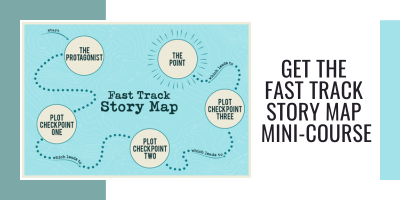 Developing your voice is one of the most important steps to becoming a writer, but the idea of a writing voice can be difficult to understand.
Developing your voice is one of the most important steps to becoming a writer, but the idea of a writing voice can be difficult to understand.WHAT EXACTLY DOES THE WRITER'S VOICE MEAN?
On the surface, it seems like something to cultivate, practice, and emulate. But the problem with this approach is that it places that voice outside of yourself, something to capture or attain.
Your writing voice is a full embrace of yourself. Your unique experience, culture, background, perspective, and opinions.
So how do you embrace yourself, warts and all, to cultivate your voice as a writer?
READ WIDELY AND WRITE OFTEN
If you want to be a writer, you must write! But only perfect practice makes perfect, so it's important to also read widely!
- Notice the authors and writing you enjoy reading
- Notice the type of writing you enjoy writing (These might be the same!)
- Ask yourself why you enjoy certain styles, and why you don't!
Understanding your preferences helps you recognize your voice. Bonus points for performing your writing!
RECOGNIZE YOUR INDIVIDUALITY
As Courtney Maum writes in Before and After The Book Deal:
"Narrative voice is your literary aura, your essence, the thing that allows writers the world over to write about the same topics in thrillingly different ways. Even though it's yours, your voice can take a long, long time to find. Postcollege, I spent two years trying to write like Raymond Carver. Raymond Carver I am not. But I got it into my head that this is what serious writing sounded like: alcoholic, importantly mundane. It was depressing to try to write like this, but the shorter my sentences got, the more I felt like I was approaching publication somewhere really big. It took me hundreds of rejections to give myself permission to dance like no one was watching - clearly, no one was. I embraced my inner freak and incorporated humor into my writing. And I started getting published."
This idea of embracing yourself in order to develop your voice, rather than emulating it, transcends all art, not just the literary kind. A friend once told me that all it takes to act is the ability to lie. This is a huge misunderstanding of acting, or art, in general. The truest art, the kind that resonates and affects us, is created not with masks or emulation, but with unabashed honesty.
Here's a quick exercise to help you determine your individuality:
1. Describe yourself in three adjectives
Look at your writing. Is it humorous? Aspirational? Clinical? Dark? Write down three words that you feel describe you and your writing style.
2. Ask others to describe you in three adjectives
It's often hard to see yourself as others do. Ask friends, family, and even strangers (if you feel bold) to describe yourself.
3. Write three adjectives that describe your favorite writers
Often, we're attracted to certain writers and writing styles because they resonate with us in some way. Ask yourself why you like these writers or styles.
Now look at this list of nine adjectives. Notice any similarities? Any glaring differences or words that feel strange, shocking, or not quite accurate to you?
Pay attention to which words resonate with you, and which do not. Then, most importantly, ask yourself why. The qualities that surprise you may be exactly the parts of yourself to explore in your writing.
"You are a very special person. There is only one like you in the whole world. There's never been anyone exactly like you before, and there will never be again. Only you." - Fred Rogers
Yes, it's advice from a children's show, but it's true! There is no one in the world with your unique life experiences, perspective, and personality. And yes, celebrating your uniqueness can be hard to do! But your uniqueness matters. Owning it on the page is what makes your writing compelling.
STUDY GENRE
Much like the background music can change the vibe of a movie (E.T. as a 90s sitcom anyone?), genre can influence voice, as well as the tone, mood, and style. The genre of any story sets up expectations for the reader:
- Thrillers might have a frenetic, fast-paced tone, with short sentences and lots of action verbs.
- Romance might feel lofty or emotional.
- A coming-of-age YA may be angsty and intense, full of slang and pop culture references.
To illustrate how voice can be influenced by genre, here’s a fun exercise: imagine greeting your next-door neighbor. How would you respond if:
- you just won the lottery
- your cat just ran away
- you suspect they poisoned the hedge between your properties
- you have a secret crush on them
- You are 10 years old
The way you write these scenarios reflects your voice. Genre sets the stage, but your unique perspective brings it to life.
Finding your voice isn't done by copying Charlotte Bronte, Stephen King, or Margaret Atwood. It is understanding your story and telling it with honesty and perspective only you can provide.
Here’s a guiding mantra for writers and artists alike:
I am enough.
When you embrace yourself as a writer, claim your voice, and believe that you are enough, you bring authenticity to your work.

Love this content?
Subscribe to The Story Guide Dispatch for more!
Find Story Guide





















0 Comments